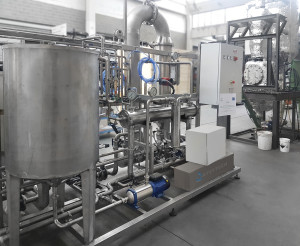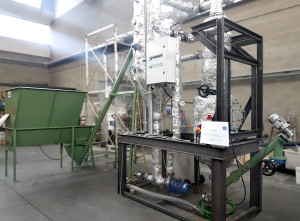LIFECAB is a R&D project, co-funded by the EU LIFE Program (LIFE16 ENV/IT/000179), which aims to demonstrate a new process to treat municipal biowaste (MBW) and produce soluble bioorganic substances (SBO). These substances will be used as additives for anaerobic fermentation reactors, with reduced entrepreneurial risk, in three different EU countries (Italy, Greece, Cyprus), to improve the environmental impact of the current fermentation technology in a circular economy perspective.
LIFECAB PROJECT
Biowaste management has become a major issue because of the increasing amount of biowastes. These stem from increasing population urbanization and consumption habits. Current biowaste management practices are based on fermentation and incineration technologies. These practices produce biogas, compost, thermal and electrical energy. The processing costs exceed the sale value of the products and raise issues connected to their secondary environmental impact.
The new process developed by LIFECAB project is based on the chemical hydrolysis of fermented MBW in water. It yields all marketable products, allows recycling all reagents and water and produces no secondary waste and process effluents needing disposal. Moreover, the SBO have been shown multipurpose products for potential use in the chemical industry, agriculture and animal husbandry.
These findings prospect that a MBW treatment plant may be turned into a biorefinery producing biofuel and value added bio based products. Most recent laboratory studies have proven that the addition of 0,05-2% SBO to the MBW organic humid fraction (OHF) fermentation slurry decrease the ammonia content of the digestate, while maintaining biogas production and quality. The effect is presumably due to the capacity of SBO to promote oxidation of ammonia to N2.
ACTIONS
The project is implemented through the following actions B1-B5:
- B1. Collection of raw and composted MBW from Italy, Greece and Cyprus;
- B2. Design and construction of prototypes: (i) one composted MBW hydrolysis prototype (HP) to be operated to produce SBO; (ii) 2 anaerobic digestion (ADP) and 2 composting prototypes;

- B3. Production of SBO from composted MBW supplied by different partners, using SBO obtained from the compost at each partner own sites;
- B4. Carrying out anaerobic fermentation, processing local raw MBW. For the project implementation action, the two reactors will be used one for the control and the other for the SBO treated fermentation. The ADP from action B2 will be used comprising two 1 m3 reactors, one for the control and the other for the treated fermentation;
- B5. Life cycle assessment. Calculation and optimization of the new process economic and environmental impact as a function of the MBW nature at the different partners locations, in order to assess results replicability and process transferability.
EXPECTED BENEFITS
Benefits are expected at two stages. In the short term, from the application in real operational environment of the new MBW anaerobic digestion process. In the longer term, from promoting biorefinery construction for SBO production at reduced entrepreneurial risk.
The longer term’s indirect benefits after project end would stem from using SBO in agriculture, in animal husbandry and in the chemical industry in place of current commercial products.
In agriculture, the use of SBO at lower dosed than compost is expected to enhance plant growth and productivity, while reducing the environmental problems connected to the use of compost. The use of SBO as feed supplement for animal husbandry is expected to reduce GHC emission, ammonia and nitrate leachates from manure. The use of SBO in place of synthetic chemical products for diversified uses would contribute to decrease the depletion of fossil sources and the consequent CO2 emission.
The ultimate benefits from recycling are a more sustainable economy and the possibility of reducing chemical fertilizers. The more ecofriendly LIFECAB digestate and SBO are expected to generate the same benefits, while reducing the environmental impact of the traditional current composts and digestates.
TODAY
HYSYTECH (project coordinator) has completed the pre-industrial scale prototype for the SBO production from the hydrolysis of compost and is currently performing the validation tests. We are starting to test the influence of the SBO on the anaerobic digester of ACEA Pinerolese, as mentioned above, evaluating the beneficial effects in terms of reduction of the ammonia compounds present in the digestate and biogas, with a simultaneous increase of the biomethane concentration in biogas.
INFO
Text by Enrico Di Nola and Simone Solaro


